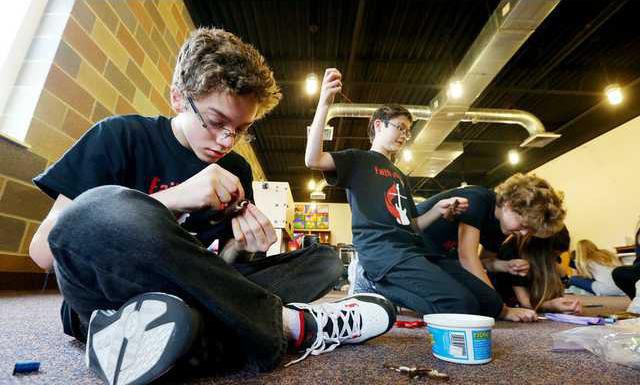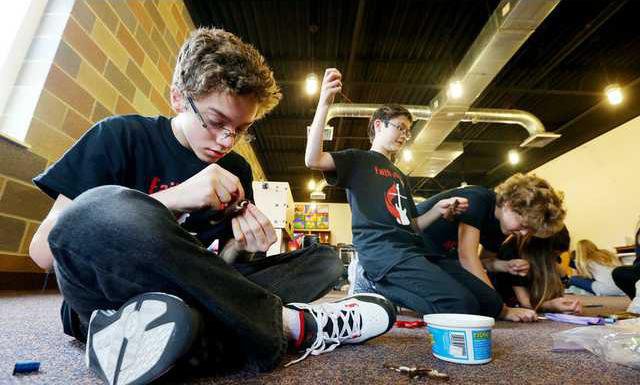Most teens probably help their families and friends at times. But new research shows those who lend a hand to people they don't even know reap a personal and valuable benefit as their sense of self-worth grows.
Caring for strangers helps adolescents care about themselves and see themselves as capable. That boost in confidence and how they view themselves lasts a year or more, according to a study by the BYU School of Family Life that's published in the Journal of Adolescence.
Teens who only help people they know don't get that same boost in self-esteem, said lead author and professor Laura Padilla-Walker. "Plenty of good things are linked to helping family and friends, but there seems to be something unique about helping someone you don't know that helps teens feel confident."
The holidays, she noted, are a great time for families to make a tradition of caring for others. And knowing that it will help boost youthful self-worth is a bonus.
The study is the latest in a series by Padilla-Walker looking at "prosocial behavior" of youths who were part of the Flourishing Families Project, though it is the first to consider what happens to self-esteem. Past research has yielded several interesting points, including the finding that teens who are altruistic and help others are more likely to avoid risky behaviors like substance abuse. They are more apt to stay out of trouble, and their family relationships are stronger, she told the Deseret News.
Padilla-Walker wrote this study with one of her former students, Xinyuan Fu, now of Central University of Finance and Economics in China.
Long-term study
The Flourishing Families Project is a longitudinal effort spanning a decade that tracked subjects in two Northwest cities. Since its inception, researchers have used the data in different ways to answer their questions. But unlike studies that try to figure out what causes families to struggle and what can go wrong in families, Flourishing Families as the name implies has focused on what goes right and strengthens families.
For this piece of the puzzle, Padilla-Walker and Fu looked at data from 681 youths, ages 11 to 14 years. Starting in 2008, they had participants respond to a series of statements annually through 2011. They were asked things like "I help people I don't know, even if it's not easy for me," and then given a scale on which to mark the level to which they agreed. The young subjects also assessed their own self-worth.
Just over half the subjects were girls, and 28 percent were from single-parent families. Consistently, the youths who engaged in helping strangers had higher self-esteem a year later, something that helping family and friends didn't increase. Overall, the study noted that boys' self-esteem was stable over time, while for girls self-esteem declined.
Helping strangers is not an easy task to sell to adolescents, who find it "more satisfying and important" to help people to whom they are close. Helping strangers which Padilla-Walker said might be viewed going "above and beyond" is "more directly protective," though, against delinquency and aggression.
Extend a hand
The finding that teens benefit when they help strangers is no surprise to Justin Powell, executive director of Youthlinc, a Salt Lake-based humanitarian organization. He's seen that happen in youthful volunteers as they mature into people who care for others over years, not just during the hours or days it takes for one-time volunteering tasks.
Youthlinc involves high school and college students in humanitarian projects both locally and internationally. To qualify for an international opportunity, the youths must provide dedicated service at a site of their choosing within the community, putting in a significant amount of time and effort to help strangers.
"When we have surveyed our participants about their perceptions of change in themselves, a lot of them report significant increases in feeling they can effect change in their community the feeling they have the skills and confidence to go for it and do something out of their comfort zone," said Powell, who wasn't involved in the BYU research.
"When they are working with people who aren't related, I think people start beginning to grow their muscle of empathizing with others and understanding there's a whole other world out there that's lovely and wonderful and that they can be part of," he said, adding most kids don't know how to find those opportunities, but organizations like his can show them how.
He speaks fondly of young people doing community service to mollify parents and who end up as ambassadors of change in diverse areas because they've learned not just to care, but to take action and to be advocates as they see need, he said.
Often, parents try to get their adolescents involved in caring for others because it's a good thing to do. The BYU study reinforced the value of that. In background material, Padilla-Walker said, "it is best if teens can directly see the benefits of their help on others. This can increase gratitude in young people and help them to focus less on their own problems. It is also a way to help them meet new friends or spend time with family."
Caring for strangers helps adolescents care about themselves and see themselves as capable. That boost in confidence and how they view themselves lasts a year or more, according to a study by the BYU School of Family Life that's published in the Journal of Adolescence.
Teens who only help people they know don't get that same boost in self-esteem, said lead author and professor Laura Padilla-Walker. "Plenty of good things are linked to helping family and friends, but there seems to be something unique about helping someone you don't know that helps teens feel confident."
The holidays, she noted, are a great time for families to make a tradition of caring for others. And knowing that it will help boost youthful self-worth is a bonus.
The study is the latest in a series by Padilla-Walker looking at "prosocial behavior" of youths who were part of the Flourishing Families Project, though it is the first to consider what happens to self-esteem. Past research has yielded several interesting points, including the finding that teens who are altruistic and help others are more likely to avoid risky behaviors like substance abuse. They are more apt to stay out of trouble, and their family relationships are stronger, she told the Deseret News.
Padilla-Walker wrote this study with one of her former students, Xinyuan Fu, now of Central University of Finance and Economics in China.
Long-term study
The Flourishing Families Project is a longitudinal effort spanning a decade that tracked subjects in two Northwest cities. Since its inception, researchers have used the data in different ways to answer their questions. But unlike studies that try to figure out what causes families to struggle and what can go wrong in families, Flourishing Families as the name implies has focused on what goes right and strengthens families.
For this piece of the puzzle, Padilla-Walker and Fu looked at data from 681 youths, ages 11 to 14 years. Starting in 2008, they had participants respond to a series of statements annually through 2011. They were asked things like "I help people I don't know, even if it's not easy for me," and then given a scale on which to mark the level to which they agreed. The young subjects also assessed their own self-worth.
Just over half the subjects were girls, and 28 percent were from single-parent families. Consistently, the youths who engaged in helping strangers had higher self-esteem a year later, something that helping family and friends didn't increase. Overall, the study noted that boys' self-esteem was stable over time, while for girls self-esteem declined.
Helping strangers is not an easy task to sell to adolescents, who find it "more satisfying and important" to help people to whom they are close. Helping strangers which Padilla-Walker said might be viewed going "above and beyond" is "more directly protective," though, against delinquency and aggression.
Extend a hand
The finding that teens benefit when they help strangers is no surprise to Justin Powell, executive director of Youthlinc, a Salt Lake-based humanitarian organization. He's seen that happen in youthful volunteers as they mature into people who care for others over years, not just during the hours or days it takes for one-time volunteering tasks.
Youthlinc involves high school and college students in humanitarian projects both locally and internationally. To qualify for an international opportunity, the youths must provide dedicated service at a site of their choosing within the community, putting in a significant amount of time and effort to help strangers.
"When we have surveyed our participants about their perceptions of change in themselves, a lot of them report significant increases in feeling they can effect change in their community the feeling they have the skills and confidence to go for it and do something out of their comfort zone," said Powell, who wasn't involved in the BYU research.
"When they are working with people who aren't related, I think people start beginning to grow their muscle of empathizing with others and understanding there's a whole other world out there that's lovely and wonderful and that they can be part of," he said, adding most kids don't know how to find those opportunities, but organizations like his can show them how.
He speaks fondly of young people doing community service to mollify parents and who end up as ambassadors of change in diverse areas because they've learned not just to care, but to take action and to be advocates as they see need, he said.
Often, parents try to get their adolescents involved in caring for others because it's a good thing to do. The BYU study reinforced the value of that. In background material, Padilla-Walker said, "it is best if teens can directly see the benefits of their help on others. This can increase gratitude in young people and help them to focus less on their own problems. It is also a way to help them meet new friends or spend time with family."





